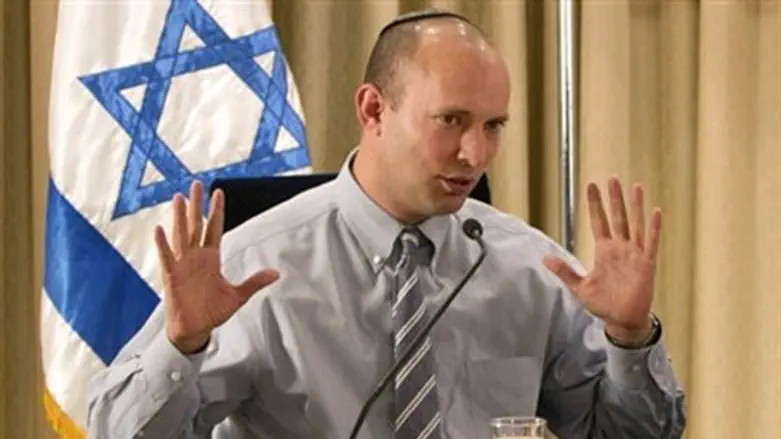
Economics Minister and Jewish Home Chairman Naftali Bennett referred to pictures to suggest that car rampage terrorist Abdelrahman Shaludi's house was not fully destroyed Wednesday, in an exclusive interview with Arutz Sheva.
On Tuesday night, IDF troops, assisted by the Israel Police and the Border Police, demolished Shaludi's Jerusalem home. Shaludi, last month, carried out a car attack near the Jerusalem Light Rail killing two people including a three-month-old baby.
"We have to move from a consciousness of defense to a consciousness of attack. For too many years, all the security systems in this country have focused on protection and placing guards. I'm working very hard on changing this through various relevant forums and the Security Cabinet," Bennett stressed.
"We need to produce a stronger type of deterrent than exists today. Right now, a terrorist can kill Jews and kill himself, feeling that heaven is assured, and knowing that his family will still have a home, national insurance, and funds from the Palestinian Authority," the Minister continued. "But the moment we destroy terrorists' houses to the ground, and deny residency and eligibility for national insurance, this equation changes."
"There are lawyers who say doing so would violate human rights, but what about the basic right to live? This is a battle I've taken upon myself. It's not easy, but I'm committed to making this change happen," Bennett said.
In response to questions about his ability to act in the Cabinet and to demand answers from the Defense Establishment, Bennett said with irritation, "It often takes time for the Israeli government to get things done. During the Intifada, it a took a year and half before starting to build a protective wall. During Operation Protective Edge, three weeks passed since I presented a plan to when it was implemented. Even this is a process. But I am continuing to fight to create deterrence and to put a stop to incitement."
Bennett also said that while security forces being able to enter into Arab neighborhoods for traffic violations, in addition to terror attacks, is "some progress," it is not enough.
When asked how he defines the current situation - an intifada, a wave of terrorism, a war, or some other definition - Bennett explained: "We are in a wave of terror that is a direct result of Abbas' incitement. We need to close this wave with the three following things: creating deterrents, ending incitement, and putting a stop to violence. All of this is possible. We need to do it with determination, mental clarity, and without fear."
Bennett also addressed the tension surrounding Jews ascending to the Temple Mount, saying this is essentially blaming the victim. "Because there are thugs running around against him, this should stop a man from doing [what he thinks is right]? The Temple Mount is the basis of our existence, and to say that we shouldn't ascend...? I do not accept these attacks as punishments for the Jews. It is that attitude that has led us to where we are now."
Minister Bennett also clarified his statement that the government has no right to exist if all it does it place concrete blocks in front of light rail stations. "I said that if the government is not willing to act and create security, it doesn't have a right to exist." When asked if he thinks the government is now acting, Bennet replied, "they are starting to work. Things are starting to move. Is it at the rate I want? Not yet, and that is why I am a member of the government."
In the second part of Arutz Sheva's interview, Bennett referred to the coalition crisis and the fear of upcoming elections. He hopes that elections are not on the horizon, since it is not a move that is beneficial to the State of Israel. Regarding his party's preparedness for election, Bennett says that although he hears voices encouraging him to push for elections, especially in light of recent polls, but he is still convinced that it would be a bad process for Israel. "It hasn't even been two years. Why have elections?"
Bennett was asked if his experience attempting to forge a pact with Yesh Atid party during the previous election - in which both parties agreed to only enter the coalition on condition that the other was as well - meant that in the future he might prefer to create an alliance with hareidi parties.
"I don't know," he responded to the question of whether his alliance with Lapid - which later fell apart over key policy differences - was a mistake, but he immediately showed encouragement to Netanyahu's call to advance the hareidi parties into the coalition.
"I am often in contact with the hareidi public and politicians. We have more in common," he admitted.
"It's not that we agree on everything," he stressed. "I do not like what has occurred in the Rabbinate throughout the years. We have progressed, and what we have in common is greater than what divides us."
Toward the end of the interview, Bennett was asked about his relationship with Jewish Home MK and Construction Minister Uri Ariel, who heads the National Union faction with which the Jewish Home party is currently in the process of merging. It is a relationship that often appears strained in light of attempts to unify the different elements of the party into one.
"I very much admire Uri Ariel. I think he's a man of principles, and effective, and I love him. I really want him to continue to run together with us."
Bennett also spoke about possible primaries, saying that Minister Ariel's place is guaranteed in the party, but that other members - who are all excellent - will have to run against each other fair and square.